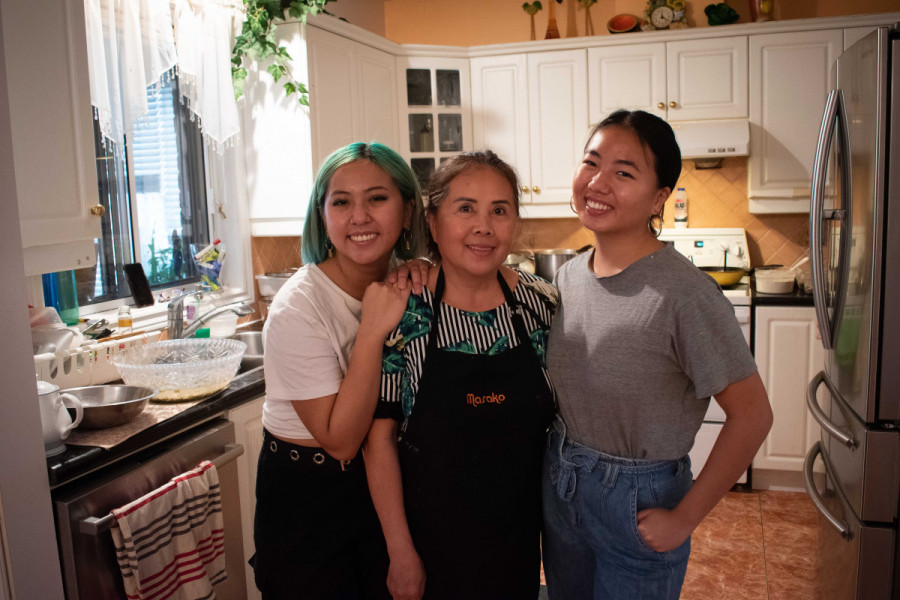The magic of Mama Ouy’s kitchen
How a home kitchen became a go-to for Cambodian takeout
It was a chilly afternoon in the St-Laurent borough of Montreal. The community was quiet, the sky still undecided over whether it wanted to rain.
For many people, this would have been a perfect afternoon for movies and tea. But at Mama Ouy’s, Heany Kuy Ouy was hard at work with her two daughters, cooking up a flurry of southeast Asian dishes. The dining table was covered with a spread of pre-made foods, empty takeout boxes, and an iPad with a list of this week’s orders.
“We’re a home-cooking business,” explained Alida Ouy, one of the daughters in the Ouy household. “We highlight our mother’s cooking, and we try to make traditional southeast Asian food that you can’t get in restaurants.”
They named their operation Mama Ouy’s, a reflection of Heany’s leadership in the kitchen and her role as matriarch of the family. Together they repurposed their home kitchen into a takeout machine, and they were getting ready for the dinner rush.
Mama Ouy’s is part of a growing trend of online takeout businesses that have emerged because of the pandemic. “Me and my sister, we weren’t working anymore. We weren’t in school,” explained Anika Ouy, the youngest of the two sisters. “We just thought it would be a fun project.”
The Ouys don’t sell their food on UberEats or in a restaurant, instead, they advertise their food on various Facebook community groups or through their Instagram page. Customers order directly through the social media chat function, and schedule a time to stop by the Ouy household and pick up their food.
Mama Ouy’s is part of a growing trend of social media home-kitchen takeout services. Facebook groups like Local 88, SHOP LOCAL – Montreal, and Montreal Food Scene host a number of advertisements for peoples’ home-cooked creations. Many of them will specialize in some kind of traditional food, from Haitian spicy peanut butter to fresh Vietnamese soup.
At Mama Ouy’s, Heany oversees all the cooking. She specializes in Cambodian food, but also tries to work in recipes from other southeast Asian countries like Vietnam and Singapore.
On October 10, she had a mix of items on the menu. The main course was Borbor Sach Moan Kuy Teav Cha, a Cambodian-Chinese rice porridge with bean sprouts, dried shrimp, and dried octopus. For dessert, a sweet pudding made with pumpkin, tapioca, and coconut milk.
While Heany is busy in the kitchen, Alida and Anika run the social media pages, photograph the food, and pack the orders neatly to give to customers.
Heany Kuy Ouy immigrated to Canada to escape the Cambodian civil war in the 1970s. She is the oldest of her family and went to work quickly after she arrived. She learned how to make sushi and opened a restaurant in Côte-des-Neiges. She then moved on to open a number of food kiosks in malls around Montreal. She eventually sold her kiosks and is now retired.
“She’s always grown up being her own boss,” explained Alida. “She’s very matriarchal, powerful, and independent.”
Heany says that she’s happy that she can now make the food that she wants to make. She also enjoys sharing her cooking with people who may not have tried Cambodian food before.
“I like to work with my daughters because it’s easy. When there’s lots to do, I can scream at them! And they’re able to help me do things that I’m not able to do when I’m busy cooking.”
Alida and Anika are used to helping their mother with her cooking. Since they were little, they would do small jobs around Heany’s sushi kiosk.
“We all have really big personalities, so we do clash a bit,” said Anika. “But it’s actually a lot of fun, and it’s brought us a lot closer.”
Since the Ouys launched their business, they have reached almost 1,000 followers on Instagram. Since then, they have connected with other cooks who are putting a spotlight on southeast Asian food.
The Ouy family do not know if they will continue cooking for long, but they are willing to consider new business opportunities should they arise. At a minimum, they are grateful for what they have accomplished so far.
“We’ve become part of a community that we didn’t know existed,” said Alida. “We hope we can leave an impact on people even if we stop.”
This article originally appeared in The Food Issue, published November 3, 2020.




_600_375_90_s_c1.jpg)

1_600_375_90_s_c1.jpg)
